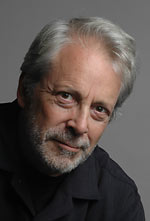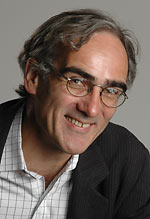UC Berkeley Press Release
Two cutting-edge researchers join UC Berkeley's School of Information Management & Systems
BERKELEY – The appointment of two renowned researchers to the faculty of the University of California, Berkeley's School of Information Management & Systems (SIMS) has been announced by SIMS Dean AnnaLee Saxenian.
 Geoffrey Nunberg |
 Paul Duguid |
(Photos by Peg Skorpinski) | |
Geoffrey Nunberg is a leading researcher in information and linguistics and a well-known print and broadcast commentator on language, and Paul Duguid is internationally known for his research in organizational knowledge. They have been co-teaching a course on "Information Quality" this semester.
Saxenian said the two came to SIMS because they share common interests in information technology as well as backgrounds in the social sciences and humanities, and they want to raise funds for a major SIMS research project exploring critical issues relating to online information quality.
"This is a huge issue for everybody," Saxenian said, noting that over the centuries, since the introduction of the printing press, society has developed mechanisms such as peer review and other standards to help readers determine the quality of print material.
"But online, we're kind of in the dark," she said.
Duguid and Nunberg will teach undergraduate and graduate classes on "The History of Information" in the fall of 2006, exploring historical episodes in the creation, storage, manipulation and use of information, with a focus on the interplay between technology and society.
Saxenian said that while SIMS has strong ties with the Haas School of Business and the College of Engineering, the addition of Nunberg and Duguid to SIMS should help it forge new and less traditional relationships with the College of Letters & Science to expand the scope of the school's research and knowledge.
Nunberg will remain a researcher with the Center for the Study of Language and Information at Stanford University, where he is a consulting professor in the Department of Linguistics. His research focuses on semantics and pragmatics, written language structure and text classification, as well as the social and cultural impacts of digital technologies.
He also is chair of the usage panel of the "American Heritage Dictionary" and is a frequent commentator on language for National Public Radio's "Fresh Air" program. His topics range from the use of language in relation to Hurricane Katrina and its aftermath to how the high court deliberations are focusing increasingly on dictionary definitions of new words driven by technology.
Nunberg also writes commentaries about language for the Sunday New York Times Week in Review and for other periodicals such as The American Prospect and the Los Angeles Times.
His book, "Going Nucular: Language, Politics, and Culture in Controversial Times" was named one of the top 10 non-fiction books of 2004 by Amazon.com.
"SIMS has established an exciting program and has been very successful in attracting top-notch students and new faculty," said Nunberg. "Moving here allows me to help in shaping the emerging field of information studies and in building connections with other Berkeley programs, particularly in the humanities and social sciences."
He has teamed up at SIMS to teach with Duguid, who is a research fellow at the University of London as well as at the Center for Science, Technology and Society at Santa Clara University. Duguid, who has an undergraduate degree in philosophy, is interested in multidisciplinary work involving computer scientists, economists, social scientists, social psychologists, linguists, management experts and others.
Duguid co-authored "The Social Life of Information" in 2000 with John Seely Brown. Business Week magazine called the book "essential reading for modern managers." It has been translated into more than a dozen languages.
Duguid also has written about digital libraries, innovation, branding and supply chains, and human-computer interaction.
"I have worked for many years as an independent researcher affiliated with places like the Institute for Research on Learning and the Xerox Palo Alto Research Center (PARC)," said Duguid. "I have had and continue to have loose affiliations with academic institutions in the United States and United Kingdom, but was hesitant about being more formally connected to academia. But the multidisciplinary character of SIMS and the invitation to join a school and a discipline that are very much in the process of defining themselves was too intriguing to pass up."
He said that for several years he has been investigating questions of information quality and is particularly interested in trying to understand issues related to information quality.
Duguid said that he hopes to continue his research on the history of brands and trademarks and the way brand-like strategies are used to endorse and authenticate information, and to discuss these issues as a teacher.

